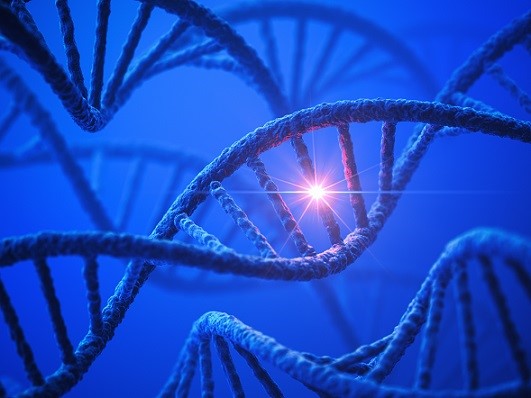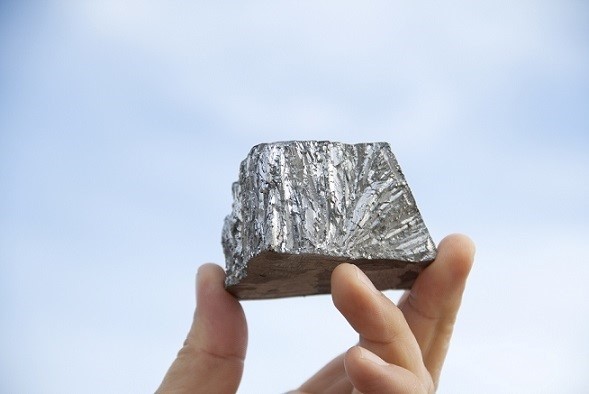 The question of whether genes cause acne is one of the most important there is. If the pimples on your face are entirely because you have a certain coding in your genome, then you can wave goodbye to any hope of ever clearing them.
The question of whether genes cause acne is one of the most important there is. If the pimples on your face are entirely because you have a certain coding in your genome, then you can wave goodbye to any hope of ever clearing them.
Many acne patients believe this is the case; they try every single face wash in the business, every single acne formula, get no results, and resign themselves to the fact that they have inherited the “acne gene”.
If that sounds like you, then here’s the happy truth:
Your genes do affect your skin, but they do not guarantee acne. They only make you more susceptible.
The pimples on your face are certainly due to genes in part. Have you ever had a friend who stuffed his face with sugary snacks, who sat around watching TV all day, and ate the greasiest junk food imaginable, all without getting any acne? He was probably very unhealthy on the inside, but thanks to his genes, that didn’t show up on his face.
But the key point is: genes do not prevent you from having clear skin. Having acne-prone genetics does makes things harder. But while you can’t alter your genome, you can still fill your body with nutritious foods and enjoy a clean-living lifestyle. With a lot of hard work you can easily avoid your “destiny” and get the clear skin you’ve always dreamed of, no matter what your genetics are.
The proof
 Firstly, here are some studies showing that genes do indeed affect acne:
Firstly, here are some studies showing that genes do indeed affect acne:
- In this Chinese study scientists gathered 975 people with acne and 580 without. They analysed all the first degree relatives of each of them, and found that those who had acne were significantly more likely to have a relative with acne. The relatives of acne patients had around a 35% chance of acne, whereas the relatives of the clear-skinned folks had a 15% chance.
- This huge study from 2002 gathered 458 pairs of monozygotic (identical) twins and 1099 pairs of dizygotic (non-identical) twins. All were women, with a mean age of 46 years. 14% of the twins reported a history of acne. The scientists discovered that the acne twins were far more likely to have a family history of acne. Somehow, the scientists calculated that 81% of the twins’ acne was attributable to genetic factors. The scientists thus concluded that there was “evidence of a major genetic influence on acne”.
- This old study from 1988 gathered 20 pairs of identical and non-identical twins, and analysed their acne severity and sebum excretion rates. The scientists found that while identical twins had a nearly identical rate of sebum secretion, their acne severity was substantially different. The scientists concluded that “these findings suggest that sebum excretion is under genetic control and the development of clinical lesions is modified by environmental factors.”
- This study was performed on 204 patients over age 25 who had endured acne since adolescence. For each patient, detailed profiles of all first-degree relatives were drawn up; relatives were asked questions about their own acne. As a comparison, 144 control patients and their relatives were also studied. The study found that while the relatives of control patients had a likelihood of having acne of just 5%, the relatives of acne patients had a 20% chance.
- This study found that patients with a family history of acne experienced more acne, and experienced it earlier, often before puberty.
- Finally this large 2009 study gathered 1002 school children over the age of 16. Numerous factors were determined in each patient; acne severity, emotional stress, nutritional habits and whether they smoked or not. Family history was also examined. The study revealed that 93.3% of the students had acne, with a prevalence of 94.4% in boys and 92% in girls. The prevalence of severe acne in those with a family history of acne was 19.9%, but only 9.8% in those without.
The conclusion is clear – genetics do play a big role in acne. However, these studies also reveal several interesting nuggets of information which show that there’s nothing to worry about.
Firstly, while the studies do show a connection, they do not provide any evidence that genetics guarantee acne. They do show that genes are involved, but there’s no evidence there that you can’t override them. They offer no reason to suggest that changing your diet and lifestyle cannot neutralise acne.
Secondly, the third study shows that sebum excretion is almost entirely identical between twins. Sebum excretion is an extremely important cause of acne, so clearly acne is under some genetic control. However, high sebum production itself does not guarantee acne.
This is shown in the results; while they found that sebum production was identical, they also found that the amount of acne between twins varied significantly. Despite their genetics being identical, they had significantly different levels of acne and this shows that other factors are involved. This clearly shows that genetics do not override every lifestyle factor; thus you can beat them and you can get clear skin.
Read Annihilate Your Acne – get the ultimate diet and clear your acne permanently!
Also important is that the twins were somewhere between the age of 14 and 26. That means that plenty of them were probably still living together and also following a fairly similar lifestyle. When siblings live together, they often eat fairly similar food, get similar levels of exercise, lead similar lifestyles; not always, but very often. Therefore the fact that they had significant difference in acne even at that age means that as they go their separate ways, the difference would become even greater.
For you, this means that the ability to influence your genetic destiny is even greater than this study reveals.
We don’t have to rely on speculation either. There’s plenty of logical ways that you can work around your genes.
Factor 1 – the sebum problem is not a problem
The study above clearly shows that sebum production is genetic and you’ve probably noticed a tendency for oily skin among certain people in your life. However sebum is only a problem when it oxidises.
Oxidised sebum is one of the two biggest causes of acne alongside inflammation, and is twice as potent at blocking pores as regular sebum. It encourages a localised increase in both sebum production and keratin, which allows oil and dead skin cells to thoroughly block your pores. Sebum oxidation is a complicated subject and you can read more about it in this article.
For now, you need to know that the real problem of having high sebum production is not the sebum itself, but that there’s a greater opportunity for sebum to oxidise. This problem has an easy solution: get more antioxidants. Antioxidants prevent your sebum from oxidising and thus they will neutralise about 60% of the harmful effects from it.
Therefore if you have a genetic tendency for very oily skin, you simply need to eat more antioxidant rich foods like fruit and vegetables, and also herbs, spices, and possibly chocolate and coffee.
Recommended – the top 6 vitamins and minerals for acne-free skin
If you do, you might achieve dramatic results. Our modern diet is so devoid of antioxidant rich foods that there aren’t enough antioxidants to even protect a normal person, let alone one with gallons of sebum pouring off his face. To enhance your efforts further you can avoid free radicals; this will make sure that the antioxidants in your body aren’t being depleted. Sources of free radicals include air pollution, rancid foods, and most notoriously, cigarettes.
You can even take selenium supplements to increase the production of your body’s own antioxidants. Gluthathione is an antioxidant that acne patients are frequently found to be deficient in, and your body manufactures gluthathione itself. Selenium, magnesium and zinc are all important for creating these indigenous antioxidants.
Factor 2 – immune system can be calmed down
 Acne patients may have a genetic tendency for excessive inflammation. More specifically, there’s evidence to suggest that compared to their clear-skinned brethren, acne patients have an immune system that reacts very strongly to acne-causing bacteria. An overly powerful reaction to p. acnes is what causes your spots to become so big, red and generally pimple-like.
Acne patients may have a genetic tendency for excessive inflammation. More specifically, there’s evidence to suggest that compared to their clear-skinned brethren, acne patients have an immune system that reacts very strongly to acne-causing bacteria. An overly powerful reaction to p. acnes is what causes your spots to become so big, red and generally pimple-like.
However there is an effective strategy to prevent this: take greater action to reduce chronic inflammation levels. If your inflammatory response is genetically strong, then you need to take every action you can to keep it under control. That means avoiding the inflammatory substances in our daily lives like sugar, chemicals such as BPA, dodgy ingredients like trans-fats, and the rest.
You can also get plenty of the nutrients which keep the immune system constrained; for example, getting extra zinc will help. Omega 3s directly restrain the immune system, and that’s a nutrient that the vast majority of the population is deficient in. In fact, most people have far higher inflammation levels than they realise. With sugar, trans-fats and chemical contaminants in foods flooding in from all directions, your ability to reduce inflammation easily outweighs the extra inflammation from genetics.
You don’t want to weaken the immune system completely of course, otherwise you would die and suffer a fate much worse than acne, but that probably won’t happen. Minerals like zinc constrain the immune system by keeping it under control; once it gets to a healthy level its activity will decrease no further. Do all this and again, you can successfully conquer your genetics.
Factor 3 – excessive keratin is not an issue
Keratin is the protein that is responsible for binding your skin cells together. However, it’s also a pimple-causing nightmare because when production is too high, your dead skin cells bind together into huge blobs and firmly block your pores. There’s plenty of evidence that acne patients have genetically higher keratin production than other people.
Yet again, though, these genes can be overcome with a little effort. The damage that keratin causes is made much worse when accompanied by sebum oxidation, so you can conquer these genetics by getting plenty of antioxidants and avoiding free radicals. Keratin production itself can be reduced by getting more vitamin A, avoiding arsenic contaminated foods, and avoiding other heavy metals.
Do your genetics doom you to acne?
 The answer is no, they definitely don’t. Don’t let anyone tell you that there’s nothing you can do. Every single problem that your genetics cause can be counteracted by working hard on your diet and lifestyle. You will have to put extra effort in, but clear skin is within your reach.
The answer is no, they definitely don’t. Don’t let anyone tell you that there’s nothing you can do. Every single problem that your genetics cause can be counteracted by working hard on your diet and lifestyle. You will have to put extra effort in, but clear skin is within your reach.
One reason why people believe the “acne is solely genetic” myth is poor experiences with conventional treatments. They try all the facial cleanses, all the antibiotics and all the Accutane they can. Often these treatments are claimed to be highly advanced, so when they fail, acne patients assume that their genetics are completely dominant.
In reality, the strategies they chose were never ones that would work. Hygiene treatments can improve acne, but they only treat the symptoms. You have to tackle the root causes, like sebum oxidation and chronic inflammation. Therefore you should never listen to the hordes of people claiming that nothing works; they weren’t using the right strategy to begin with! If you do meet them then make sure you tell them the truth. Tell them that diet is the real cause of acne and tell them that their genes are not unstoppable.
What you must do now
Here’s a summary of the information above. To make your acne-causing genes irrelevant, you need to 1) get extra antioxidants, 2) avoid free radicals, 3) take extra efforts to avoid chronic inflammation, and 4) keep your immune system under control by getting plenty of zinc and other nutrients. You can also use any other acne-busting strategy in order to mitigate the damage from genes as much as you possibly can.
These suggestions are strategies that all acne patients should be following anyway. Put simply, having acne genetics means that you need to accelerate your efforts everywhere.
Don’t be disheartened about a life of hard work and struggle though; such strategies are actually important for your overall health.
By neutralising the free radicals that are so prone to wreaking havoc on your cells, antioxidants are great at extending your life span. Omega 3s are critical for brain health, and by getting more, you might enjoy a consistently sunnier mood. Lowering sugar will keep your heart healthy, prevent your teeth from dropping out, and supercharge your health in nearly every way.
Therefore while your acne genes may have destroyed your skin at one point, you should actually be thankful for them in a way because they encourage you to be an extremely healthy person. My acne genes are terrible so I have to put tons of effort in, but I’ve noticed all sorts of other benefits since I started. I have far more energy, my brain is extremely sharp, and my muscles are more relaxed and less stiff, partly due to lowered bodily inflammation.
The top 7 topical treatments for clearing acne naturally
In particular, I used to suffer from random episodes of breathless; like I could never fill my lungs with enough air no matter how hard I tried. I had no idea what the cause was and it was seriously debilitating at times…
Then I started drinking a magnesium supplement every day. Out of nowhere, I no longer had any short breath, even when undergoing hard exercise. Later I discovered that magnesium is important for relieving muscle tension, so the muscles around my lungs were probably more relaxed. I had inadvertently cured a problem that had worried me for over two years.
It’s entirely possible that you’ll experience some fantastic benefits too. Your acne genetics might be terrible, but there’s nothing you can do about them. You might as well look on the bright side. You’re far more likely to enjoy a healthy and prosperous life compared to if you didn’t have them.
Conclusion
To conclude I will tell you my own story of how genetics can be conquered. Acne is very common in my immediate family and since I was a teenager, my sebum production has always been astronomically high. I had pimples from age 12 onwards and the acne turned truly horrific at about age 14.
However, these days I don’t have any acne at all. Why? Because I make sure I eat tons of antioxidants, I take special care to avoid inflammation, and I get all the minerals required. I consume no added sugar whatsoever; I only eat sugar from whole foods like fruit.
My genetics are still in full force. I still wash my face with water three times a day because it’s just so oily, and having my larger than average skin pores won’t have changed. However I have still managed to destroy my acne once and for all.
You can do the same; eat cleanly, work hard, don’t give in to temptation (you can occasionally), and don’t let the moaners and whiners deter you!
NEXT: get the complete strategy for clearing acne naturally
Thanks for reading!
Thank you for the wonderful article. I was just thinking that my acne issue would never be conquered since it’s most probably due to genes. I’m so relieved that it CAN actually be overcome.
However, I do eat quite healthily and exercise regularly. Could you specify on the minerals that I should be taking? Zinc, I realised, was one mineral I failed to consume regularly, as is omega-3 fats. Could you please recommend me the minerals and nutrients that would allow me to have clear skin like your’s?
Thanks for being such an inspiration:)
P.s. do you use any lotions or moisturizers as your skin care routine?
I wrote an article on the best acne nutrients here. https://supernaturalacnetreatment.com/top-5-acne-nutrients/
No I don’t use any lotions or moisturisers as part of my regular routine, and I don’t recommend them because grocery store products contain additives which redden and inflame existing acne. My diet is nutritious enough that my skin stays smooth and supple without the need for them. The main secret for that is vitamin C. However if you want to use them then shea butter is an effective natural moisturiser (beats cocoa butter and coconut oil, which while effective have a huge tendency to clog skin pores). Yeah, omega 3s are very important; I discuss them in my eBook. Zinc is great and is covered in the article above. Agreed – it’s a great feeling when you realise your skin is entirely in your control and in your hands.
Hello Richard
Do you know about epigenetics/ the epigenome? I was thinking maybe there is a way we can turn off our genes for acne. Do you think if we eat only healthy food and drink for many years as in decades that the gene expression will change for the better?